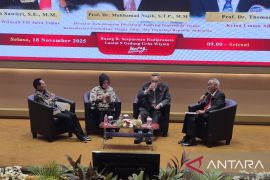In recent years, a growing number of water springs in the vicinity of Israeli settlements throughout the West Bank have become the target of settler activities that eliminated, or put at risk, the access to these springs and their use by PalestiniansUnited Nations (ANTARA News/Xinhua-OANA) - Palestinians living in the West Bank have been losing access to water springs due to the actions of Israeli settlers in the area, which has had negative impacts on agriculture and domestic life, according to a report released here Monday by the UN`s humanitarian arm.
"In recent years, a growing number of water springs in the vicinity of Israeli settlements throughout the West Bank have become the target of settler activities that eliminated, or put at risk, the access to these springs and their use by Palestinians," said the report by the UN Office for the Coordination of Humanitarian Affairs (OCHA).
The report titled "How Dispossession Happens: The Humanitarian Impact of the Takeover of Palestinian Water Springs by Israeli Settlers" was compiled using data from an OCHA survey carried out over the course of the last year.
The survey recorded that out of the 56 springs located close to Israeli settlements, 22 have been the sites of determent of access by intimidation, threats or violence by Israeli settlers.
At eight springs controlled completely by settlers, fencing and annexation to the settlement has been used to prevent Palestinians from gaining access to water, said the report.
The OCHA report emphasized the importance of water springs to Palestinians.
"Despite the decline in their yield, springs have remained the single largest water source for irrigation and a significant source for watering livestock," said the report. "Albeit to a lesser extent, springs are also a source of water for domestic consumption."
According to the report, there have been measurable economic effects of lack of spring access.
"The loss of access to springs and adjacent land reduced the income of affected farmers, who either stop cultivating the land or face a reduction in the productivity of their crops," the report explained. "Other farmers, herders, and households are confronted with increased expenditures, due to the need to purchase more expensive piped or tanker-ed water."
(C003)
Editor: Ella Syafputri
Copyright © ANTARA 2012











